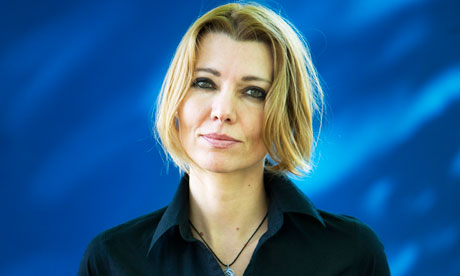
Elif Shafak begins her new novel with a dedication containing a dark and portentous anecdote: when she was seven years old, she lived next door to a tailor who was in the habit of beating his wife. "In the evenings, we listened to the shouts, the cries, the swearing. In the morning, we went on with our lives as usual. The entire neighbourhood pretended not to have heard, not to have seen."
Having dedicated her book to "those who hear, those who see", Shafak hands over to Esma Toprak, a London-bred Turkish Kurd, as she prepares to set off for Shrewsbury Prison to collect her brother, who has just served a 14-year term for murder. It is implied, but not confirmed, that his victim was their mother. Esma admits to having thought often about killing her brother in revenge. And yet she plans to welcome him back into the house she now shares with her husband and two daughters.
This is the cloud that hangs over the next 300-odd pages, as Esma offers up fragments of family history, beginning with her mother's birth in a village near the Euphrates. She describes a world where women as well as men enforce an honour code that results in the social death of men who fail to act like men, and the actual death of several female relatives. When her family migrates to Istanbul, and then to London in the early 1970s, they take that code with them, but as they grow accustomed to life in the west it becomes less a system of social regulation than a compulsion they can neither control nor understand.
Adem, the father, falls in love with an exotic dancer. Disgraced, he drifts away. Iskender, the eldest son, is left unprotected and is brutally bullied before forming his own gang and doing much worse to others. His views on masculinity are further sharpened by the neighbourhood's fledgling radicals and he has one rule for his English girlfriend and another for Pembe, his mother. Tradition dictates that he is now the head of the household, and even though she does not like him controlling her, she nevertheless defers to him, going out of her way to convey her approval for her "sultan".
Running in parallel with this all-too-familiar tragedy is another story. Even in that village near the Euphrates, where mothers grieve at the birth of each new daughter, women wield considerable social powers, although they are inclined to express them through dreams, premonitions, and potions. They also impart a gentler Islamic tradition of mercy and compassion, encouraging an imaginative engagement with both tradition and the modern world. Pembe longs to travel, and she has her wish. Her twin sister Jamila stays behind to become the region's fabled Virgin Midwife, travelling fearlessly through territories controlled by bandits, trusting her fate to God's hands. When a dream signals that her twin is in danger, Jamila has no trouble finding the people who can get her to London without proper documentation. The two younger Toprak children show a similar independence of thought as they struggle to resolve the contradictions that have brought their family down.
Shafak is an extremely popular novelist in Turkey, particularly loved by young, educated and newly independent women who appreciate her fusion of feminism and Sufism, her disarmingly quirky characters and the artful twists and turns of her epic romances. Born in Strasbourg to a diplomat mother, educated in Europe, the United States and Turkey, she writes some books in her native Turkish and others (like this one) in English. In everything she writes, she sets out to dissolve what she regards as false narratives. In this one, it's the story of the "honour killing" as we know it from those shock headlines. The book calls to mind The Color Purple in the fierceness of its engagement with male violence and its determination to see its characters to a better place. But Shafak is closer to Isabel Allende in spirit, confidence and charm. Her portrayal of Muslim cultures, both traditional and globalising, is as hopeful as it is politically sophisticated. This alone should gain her the world audience she has long deserved.
• Maureen Freely's Enlightenment is published by Marion Boyars.

